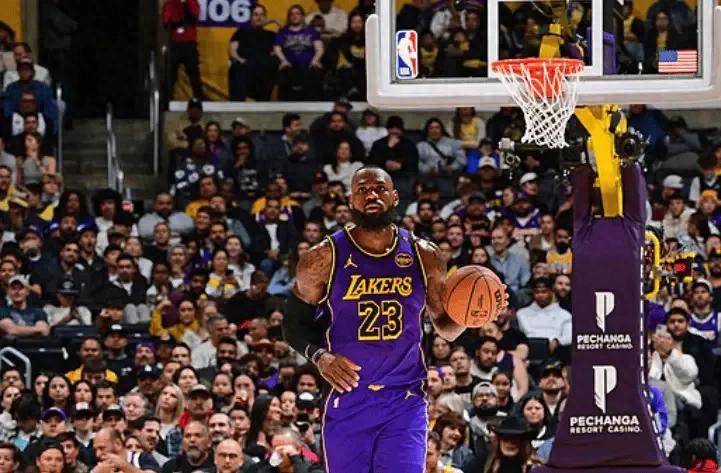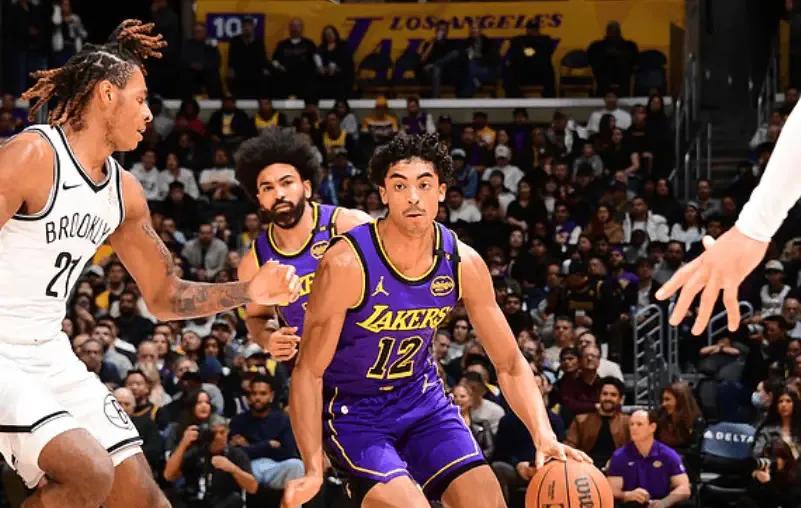NBA regular season continued with the Lakers defeating the Nets 102-101 at home, securing their second consecutive win. The Lakers started the game in mediocre form, struggling with missed shots and turnovers on offense, but fortunately, the Nets' offense was also inconsistent, allowing the Lakers to maintain a narrow 24-23 lead in the first quarter. In the second quarter, the Lakers' offensive struggles persisted, relying on the Nets' frequent turnovers to gradually build a double-digit lead, which they quickly relinquished. At halftime, the Lakers held a slim six-point lead over the Nets.
In the third quarter, due to LeBron James' reluctance to attack, the Lakers were quickly overtaken in scoring. However, Vincent Reeves stepped up, helping the Lakers regain their advantage. In the final quarter, both teams suddenly unleashed a barrage of three-pointers, with Reeves exploding for crucial points that ultimately secured the victory for the Lakers. With the win, the Lakers improved their record to 22 wins and 17 losses. So, where exactly did the Lakers win this game? Perhaps the data can provide some answers.

LeBron James had an impressive performance, shooting 12 for 17 from the field, 4 for 6 from three-point range, and 1 for 2 from the free-throw line, accumulating 29 points, 7 rebounds, 8 assists, 1 steal, and 2 blocks with 5 turnovers. While his efficiency was high, James' offensive aggressiveness was lacking before the fourth quarter. With Anthony Davis out, and neither Vanderbilt nor DFS playing, the Lakers relied heavily on James to carry the offensive load, which he did admirably despite the need to better control his turnovers.
Reeves had a standout game, shooting 13 for 23 from the field, 4 for 8 from three-point range, and a perfect 8 for 8 from the free-throw line, totaling 38 points, 3 rebounds, 3 assists, 2 steals, and 1 block. Although defense remains a weak point, Reeves' attitude was commendable, as he played aggressively and tried to block opponents whenever possible. On offense, he took on the responsibility of a core playmaker for the Lakers, efficiently distributing the ball and exceeding expectations in terms of both personal scoring and volume. For a player earning $15 million annually, Reeves' performance was well worth the investment.

Hachimura struggled without Davis on the court, shooting 4 for 10 from the field, 1 for 4 from three-point range, and 1 for 1 from the free-throw line, finishing with 10 points, 6 rebounds, 4 assists, and 1 turnover. Without Davis drawing attention in the paint, Hachimura found limited offensive space. His efficiency was low, except for a few successful dunks. Defensively, he was a liability, with poor positioning and frequent lapses that caused headaches for the team.
Christie performed well defensively, forcing numerous turnovers from the Nets with his high defensive intensity and efficiency. However, offensively, he was limited to finishing plays rather than initiating them, as evidenced by his shooting performance (2 for 13 from the field, 2 for 8 from three-point range, and 1 for 2 from the free-throw line) for a total of 7 points, 3 rebounds, 3 assists, and 1 turnover.

Hayes, starting in place of Davis, brought energy to the Lakers with his dunks and personal drives to the basket, contributing 6 points, 9 rebounds, 1 assist, and 1 turnover. However, his focus on scoring sometimes hindered the team's flow, as he often overlooked his teammates in favor of going for the basket.
Among the bench players, Vincent was the most reliable, shooting 4 for 8 from the field, 1 for 5 from three-point range, and 1 for 2 from the free-throw line, scoring 10 points with 1 rebound, 3 assists, 2 steals, 2 blocks, and 1 turnover. His defensive presence was strong, but his offensive output was inconsistent.
The rest of the bench players, including Kinkead, who shot 0 for 4 from the field, 0 for 3 from three-point range, and 2 for 3 from the free-throw line for a total of 2 points, 1 rebound, and 1 assist, had a disastrous performance. New additions Jamison and Milton made no significant contributions, resulting in an overall underwhelming performance from the Lakers' bench. However, given the roster's composition of minimum-wage players, rookies, and even two-way players, such a performance is to be expected from a developmental league setup.